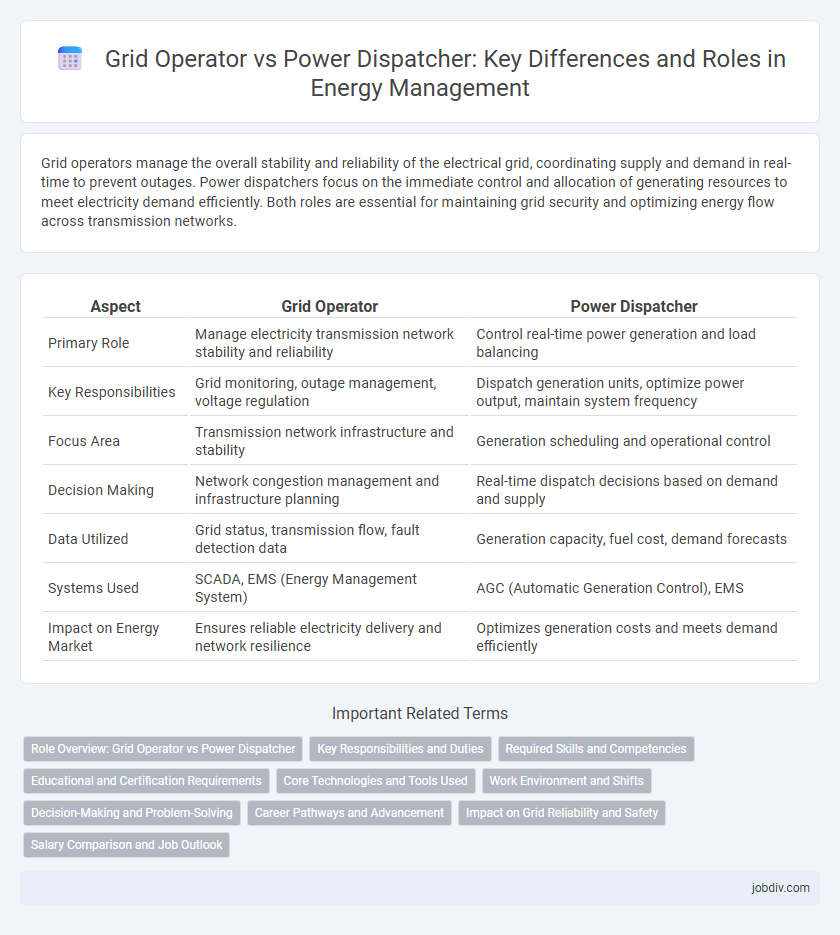Grid operators manage the overall stability and reliability of the electrical grid, coordinating supply and demand in real-time to prevent outages. Power dispatchers focus on the immediate control and allocation of generating resources to meet electricity demand efficiently. Both roles are essential for maintaining grid security and optimizing energy flow across transmission networks.
Table of Comparison
| Aspect | Grid Operator | Power Dispatcher |
|---|---|---|
| Primary Role | Manage electricity transmission network stability and reliability | Control real-time power generation and load balancing |
| Key Responsibilities | Grid monitoring, outage management, voltage regulation | Dispatch generation units, optimize power output, maintain system frequency |
| Focus Area | Transmission network infrastructure and stability | Generation scheduling and operational control |
| Decision Making | Network congestion management and infrastructure planning | Real-time dispatch decisions based on demand and supply |
| Data Utilized | Grid status, transmission flow, fault detection data | Generation capacity, fuel cost, demand forecasts |
| Systems Used | SCADA, EMS (Energy Management System) | AGC (Automatic Generation Control), EMS |
| Impact on Energy Market | Ensures reliable electricity delivery and network resilience | Optimizes generation costs and meets demand efficiently |
Role Overview: Grid Operator vs Power Dispatcher
Grid Operators manage the overall electrical grid infrastructure, ensuring balance between electricity supply and demand, maintaining grid stability, and coordinating with power plants and substations. Power Dispatchers control and direct the real-time flow of electricity, making minute-by-minute decisions to optimize generation dispatch and respond to system disturbances or outages. Both roles are critical for reliable grid operations, with Grid Operators overseeing macro-level system integrity and Power Dispatchers focusing on tactical control of power delivery.
Key Responsibilities and Duties
Grid Operators monitor and control the electric power grid to ensure stability, reliability, and efficient distribution of electricity across regions. Power Dispatchers focus on real-time allocation and coordination of power generation resources to meet demand, manage outages, and optimize grid performance. Both roles require precise communication and decision-making to maintain continuous power supply and prevent disruptions.
Required Skills and Competencies
A Grid Operator requires in-depth knowledge of electrical grid infrastructure, real-time monitoring skills, and proficiency in grid stability management to ensure continuous power delivery. Power Dispatchers need expertise in load forecasting, communication skills for coordinating between power plants and substations, and quick decision-making abilities to balance supply and demand efficiently. Both roles demand strong analytical thinking, situational awareness, and familiarity with energy management systems to maintain grid reliability.
Educational and Certification Requirements
Grid operators typically require certifications such as the North American Electric Reliability Corporation (NERC) System Operator Certification to ensure competence in managing high-voltage transmission networks, alongside formal education in electrical engineering or energy management. Power dispatchers often hold certifications from recognized institutions like the Association of Energy Engineers (AEE) and benefit from specialized training in real-time system control and load balancing. Both roles demand continuous education to stay updated on energy regulations, grid technologies, and safety protocols critical for reliable energy distribution.
Core Technologies and Tools Used
Grid operators utilize advanced SCADA (Supervisory Control and Data Acquisition) systems and energy management systems (EMS) to monitor and control the electrical grid in real time. Power dispatchers rely heavily on geographic information systems (GIS), automated generation control (AGC), and load forecasting tools to manage power flow and maintain grid stability. Both roles integrate AI-driven analytics and communication technologies to optimize grid performance and ensure reliable energy delivery.
Work Environment and Shifts
Grid operators manage the overall electricity grid to ensure stability and reliability, typically working in control centers with real-time monitoring systems. Power dispatchers focus on directing power flows and coordinating generation resources, often requiring rapid decision-making under pressure in similar control room environments. Shift patterns for both roles usually involve rotating schedules covering 24/7 operations to maintain continuous grid supervision and quick response to emergencies.
Decision-Making and Problem-Solving
Grid operators focus on overseeing the overall electricity network's stability by monitoring grid performance and managing supply-demand balance in real time. Power dispatchers make tactical decisions to route electricity efficiently, responding swiftly to outages or fluctuations to prevent blackouts. Effective decision-making in grid operations relies on predictive analytics and real-time data, while power dispatching emphasizes rapid problem-solving and coordination with field crews to restore power promptly.
Career Pathways and Advancement
Grid operators coordinate the real-time flow of electricity across transmission networks, ensuring system reliability and balancing supply with demand. Power dispatchers focus on directing energy production resources, optimizing generation schedules, and managing emergencies within power plants or control centers. Career advancement often begins with technical training or certification, progressing to supervisory roles in grid management or dispatch operations, with opportunities to specialize in renewable integration or smart grid technologies.
Impact on Grid Reliability and Safety
Grid operators maintain overall system stability by balancing supply and demand in real-time, ensuring continuous power flow and preventing blackouts. Power dispatchers execute operational commands from grid operators, managing generation units and responding to immediate grid conditions to mitigate risks. Their coordinated roles are crucial for enhancing grid reliability and safety by minimizing outages and maintaining voltage and frequency standards.
Salary Comparison and Job Outlook
Grid operators earn an average annual salary of $70,000 to $90,000, reflecting their responsibility for managing the high-voltage transmission system and ensuring grid stability. Power dispatchers typically earn between $60,000 and $80,000, focusing on controlling power flow and coordinating generation resources to balance supply and demand. Job outlook for both roles remains strong due to increasing renewable integration and grid modernization efforts, with demand expected to grow by approximately 5% over the next decade.
Grid Operator vs Power Dispatcher Infographic

 jobdiv.com
jobdiv.com